Sonderweg oder Anderweg? -- An interactive AAR in the Hohenzollerns megacampaign
- Thread starter Avindian
- Start date
-
We have updated our Community Code of Conduct. Please read through the new rules for the forum that are an integral part of Paradox Interactive’s User Agreement.
You are using an out of date browser. It may not display this or other websites correctly.
You should upgrade or use an alternative browser.
You should upgrade or use an alternative browser.
the Ministry of War proposes that those non-Hussar armies which do not have Engineer units now receive them.
((Guessing this should be 8 or so)).
Hals Gutfreund, Minister of War
((Guessing this should be 8 or so)).
Hals Gutfreund, Minister of War
((No changes to the tech plan unless we are running out of the ones I originally proposed))
((Brothersid, you are only bumping up the industrial stockpile, correct, leaving Army and Navy at 50%?))
((Correct))((Brothersid, you are only bumping up the industrial stockpile, correct, leaving Army and Navy at 50%?))
((Okay, thanks. I'm going to play soon, and then update. I don't have a specific time frame for you, but soon!))
EDIT (7/28/14): ((Hello everyone, sorry I've been slacking of late. I finished playing yesterday and will update later today sometime.))
EDIT (7/28/14): ((Hello everyone, sorry I've been slacking of late. I finished playing yesterday and will update later today sometime.))
Last edited:
Election of 1858
The question of the kidnapping of Ferdinand von Hohenzollern was on everybody’s lips for most of 1857 and 1858. The boy’s kidnapper – his mother – was quickly and efficiently arrested by the Corps of Gendarmeries less than 30 days after the boy was reported missing. However, the boy himself was nowhere to be found. She refused to say what she’d done with Ferdinand, and so she was arrested and brought to the headquarters of the Ministry of the Interior. The most skilled interrogators in all of Germany all had a chance to question her, but nobody could produce any results. “The woman,” as she was known, simply disappeared into the depths of the Ministry’s dungeons. Periodic attempts were made to elicit more information, but they were almost pro forma instead of genuinely trying to achieve results.
The first consequence of the investigation, in February of 1857, was the arrest of one of “the woman’s” co-conspirators, a Venetian citizen. Venice demanded the man’s immediate release; Michael von Hohenzollern, the Foreign Minister, responded with an enraged, “This is your last warning: stay out of German business or you will regret it.”
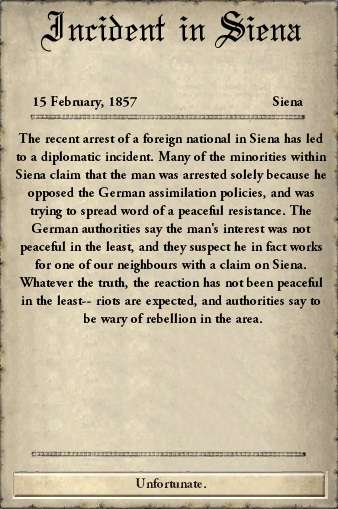
The next hot spot was in the city of Cambrai, as French citizens there insisted upon greater autonomy for minorities in the Republic. Minister von Altmark’s one word response was extremely crude and left no doubt as to his opinion of such requests. A demonstration against the Minister of the Interior turned violent, and the Gendarmerie, once again, had to use force to regain order.

A Polish flare up in Swinemünde gave the Minister the opportunity to institute a new plan of building restrictions, designed to encourage Poles to speedily seek and apply for German citizenship.

However, this new policy met with resistance, and a demonstration once again turned violent as the Gendarmerie rounded up the ringleaders of the revolt and put them down permanently.
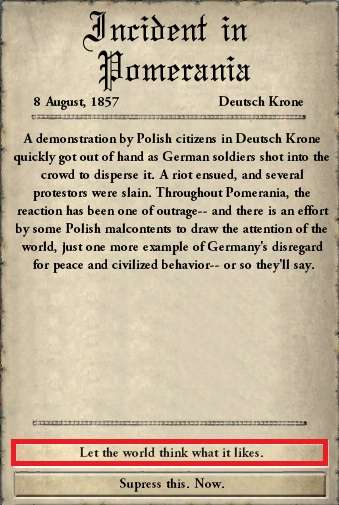
Life for Germans, however, had never been better. A new policy of organizing factories showed very promising results, to the point where some political leaders in the Ruhr Valley requested the easing of internal tariffs and deregulation in an effort to encourage industrial growth there.

However, such a decision could only be made once the Reichstag had reconvened in full after the 1858 elections. German education policy shifted to philosophy and the arts, as Carlo Brunelli, the Minister of Education, tried to show the world that Germany wasn’t only armies, police, and minority repression.
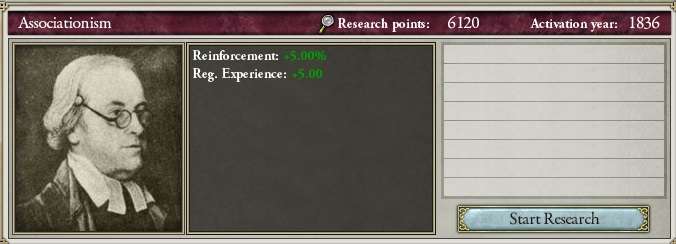
Perhaps it was fear, self-interest, or simply pragmatism, but countries continued to sign voluntary Economic Agreements with Germany, despite its somewhat dodgy international reputation; in particular, Bulgaria and Yemen were added to the sphere of influence. Fortunately, Ethiopia’s track record was even worse, and an international crisis between Benin and Ethiopia was very quickly ended in a White Peace after Germany refused to take part and the Byzantines supported Benin.
The most significant international news came at the end of 1857. Another revolution in Transylvania spurred a corresponding uprising in Castille.
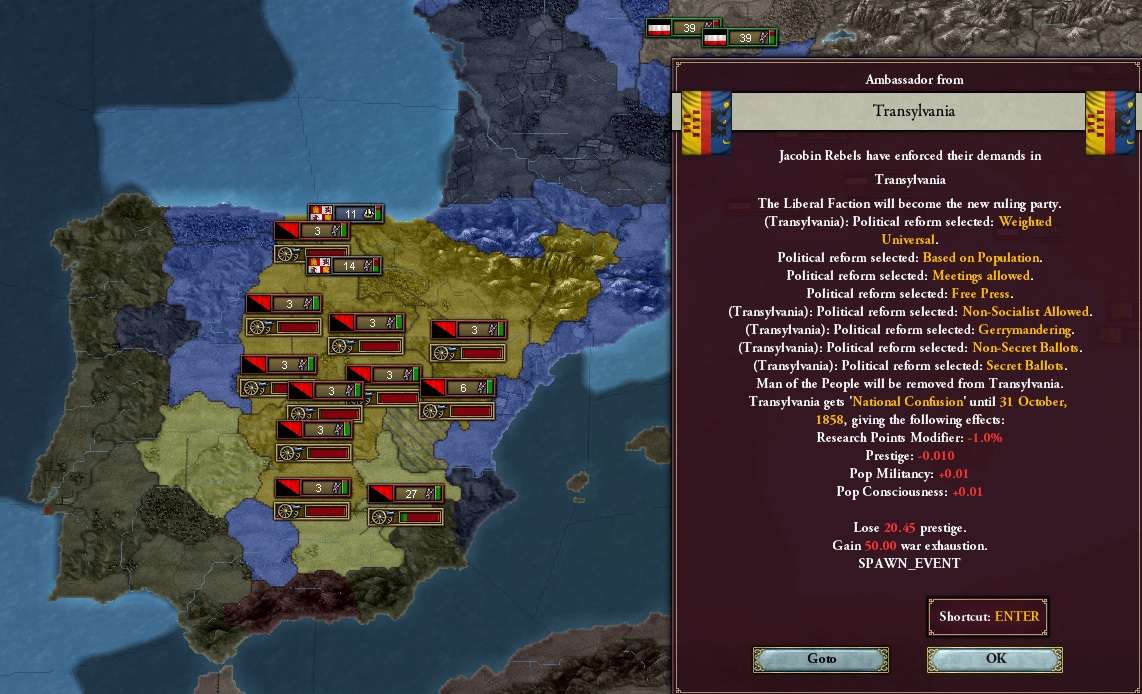
After secret negotiations with the Foreign Minister and other important German politicians, Castille and Granada agreed to a Treaty of Union, in which Granada swore fealty to the King of Castille and was completely absorbed into the Kingdom, in exchange for the protection of the Castillian army and representation in the Cortes. [1]
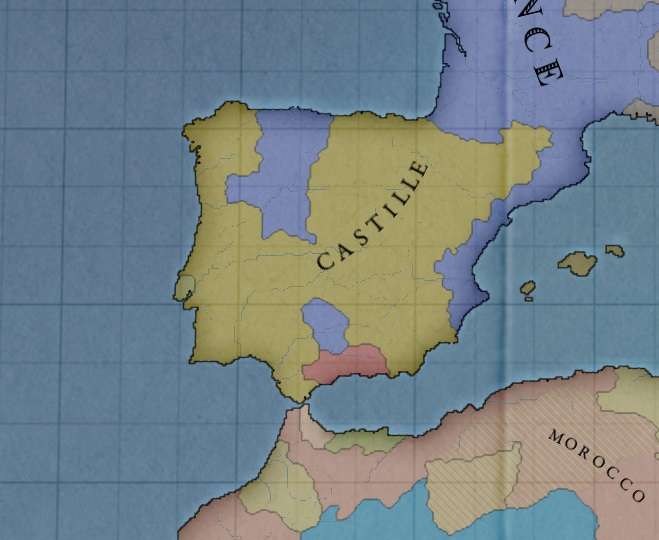
Horrified by this meddling in the internal politics of Castille – especially given Michael’s fury when Venice tried to interfere with German politics – Carlo Brunelli took the podium at the Conclave of Stadtholders, demanding a “hands off” policy in all facets of German society and political activity. His oratorical dynamism swayed more than a few voters to the DDA.
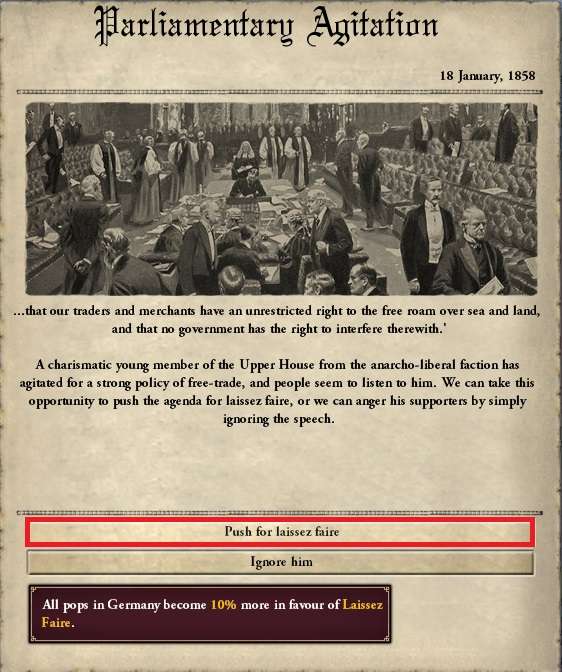
As election proceedings began in early 1858, there was considerable controversy. Although constitutionally allowed to do so, a few voices in every party were appalled at Chancellor Bismarck’s decision to seek a third term. The New Society, as a whole, was losing votes to the HUN and Imperialists, as every political observer claimed. Maybe the HUN would field the next Chancellor, or perhaps the UAI would seek to regain power.
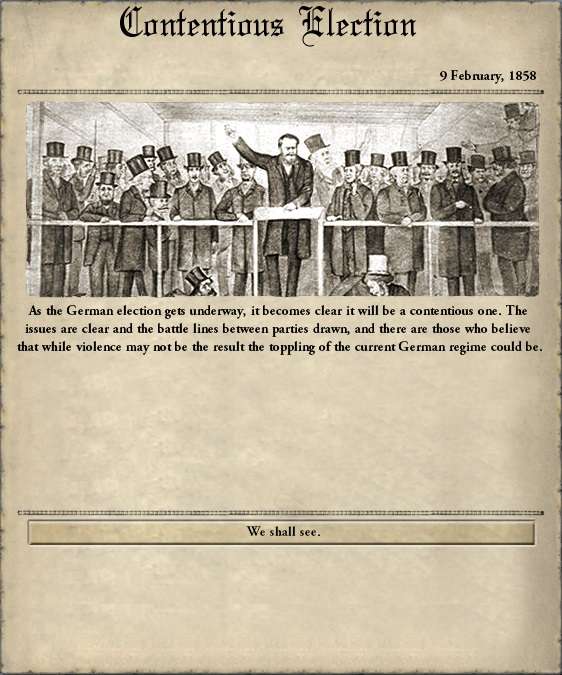
The dominant issue in the election wasn’t foreign policy – it was domestic policy. A group of concerned citizens from all walks of life spoke up in the Reichstag, seeking “an equal vote for all citizens.”
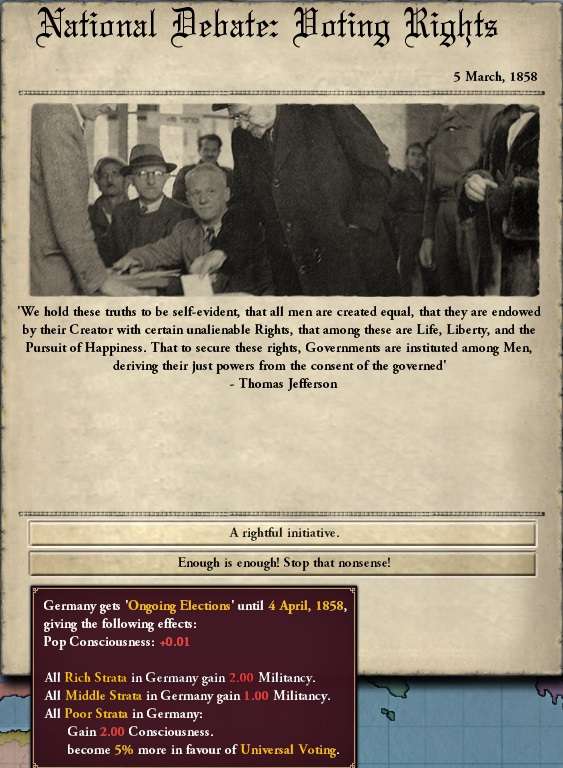
True, the liberal support of the Conclave grew stronger as a result, but not enough to break through the stranglehold the conservatives had.
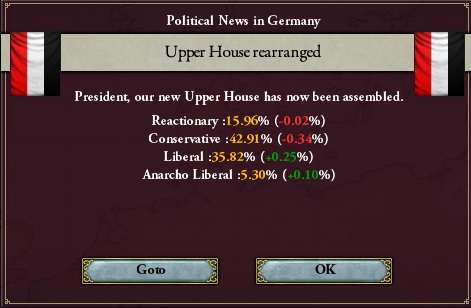
When the results for the Assembly came in, there was genuine shock.
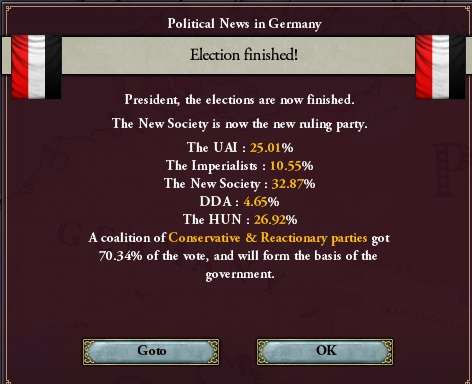
The New Society had broken away, stronger than ever. The DDA, instead of flourishing as a result of the Minister of Education’s speech, all but collapsed. The drama of the Ferdinand situation kept the HUN in roughly the same position, but the UAI lost supporters to the New Society. The Imperialists lost a handful of votes to the New Society as well. Chancellor Bismarck was in the driver’s seat for a new coalition. But who would come after him? Would he seek a constitutional amendment, allowing him to run for a fourth term? Would the other parties band together to keep him out of power? And what of Germany? Would she finally begin to accept minorities in political life, or would they continue to be suppressed at every turn?
[1] Actually, I forgot to merge the countries until the rebellion broke out in Castille. :blush:
Jack LEagle, everybody has an engineer regiment, except the African Army, but theirs is on the way.
So, coalition negotiations may begin now! Somebody may also wish to put forward the idea of voting for the Ruhr Boom, but that’s just my opinion.
Last edited:
From what my correspondences tell me, the DDA, HUN and UAI have all agreed to maintaining the National Coalition. Therefore, I shall seek to maintain this coalition by assembling a new cabinet straight away. I will need time to consult my coalition partners on the matter.
- Otto von Bismarck
- Otto von Bismarck
The Third Bismarck Cabinet
Minister of the Interior: Michael von Hohenzollern
Foreign Minister: Herr von Hohenstaufen
Minister of War: Hals Gutfreund
Minister of Finance: Dominik Fellman
Minister of Education: Carlo Brunelli
President of the State Planning Commission: Friedrich Meier
Minister of the Interior: Michael von Hohenzollern
Foreign Minister: Herr von Hohenstaufen
Minister of War: Hals Gutfreund
Minister of Finance: Dominik Fellman
Minister of Education: Carlo Brunelli
President of the State Planning Commission: Friedrich Meier
Last edited:
The Third Bismarck Cabinet
Minister of the Interior: Michael von Hohenzollern
Foreign Minister: Herr von Hohenstaufen
Minister of War: Hals Gutfreund
Minister of Finance: Dominik Fellman
Minister of Education: Carlo Brunelli
President of the State Planning Commission: Friedrich Meier
Better?
No
Free markets, free trade, free people!
-DDA slogan
I propose we adopt the Ruhr Valley plan to encourage industrial growth in the Ruhr Valley. The easing of tariffs and the adoption of laissez-faire policy should cause our economy to boom further.
-Carlo Brunelli
((Isn't that screenshot just from the Upper House election? I can't imagine anarcho-libs would much representation there))
-DDA slogan
I propose we adopt the Ruhr Valley plan to encourage industrial growth in the Ruhr Valley. The easing of tariffs and the adoption of laissez-faire policy should cause our economy to boom further.
-Carlo Brunelli
((Isn't that screenshot just from the Upper House election? I can't imagine anarcho-libs would much representation there))
Free markets, free trade, free people!
-DDA slogan
I propose we adopt the Ruhr Valley plan to encourage industrial growth in the Ruhr Valley. The easing of tariffs and the adoption of laissez-faire policy should cause our economy to boom further.
-Carlo Brunelli
I second this proposal. Though I would remind Herr Brunelli that this economic boom is due to my Uncle's early industrial plans finally coming to fruition.
FM
((Isn't that screenshot just from the Upper House election? I can't imagine anarcho-libs would much representation there))
((Election file screenshot added.))
I should like to know, please, how strong the support for these voting reforms is thought to be amongst the people of Germany. This may be just a passing fad.
This proposal has my vote as well.I second this proposal. Though I would remind Herr Brunelli that this economic boom is due to my Uncle's early industrial plans finally coming to fruition.
FM
I admit that I don't have much of a mind for economics, but if Herr Meier agrees with the Ruhr Valley plan then I have little doubt that it will be beneficial. I support the Ruhr Valley Plan.
I propose we adopt the Ruhr Valley plan to encourage industrial growth in the Ruhr Valley. The easing of tariffs and the adoption of laissez-faire policy should cause our economy to boom further.
-Carlo Brunelli
I totally agree. Only advantages can come from this initiative!!!

